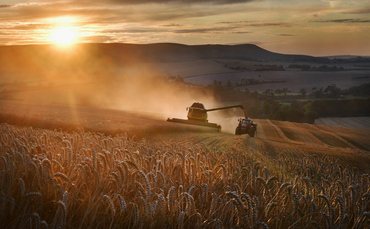'Farmers are staring down the barrel': Researchers warn agricultural industry facing fertiliser cost timebomb


Fresh analysis from ECIU and University of Edinburgh warns that escalating prices of fertilisers is having knock-on effect on farmers and global food security
The soaring costs of fertiliser is set to have a huge impact on farming businesses this year, fuelling fears that an additional 100 million people globally could be put at risk of undernourishment.
That is the stark warning from two separate studies this week that warn rising fertiliser costs represent both a significant economic headwind and a further threat to global food supplies that are already facing disruption as a result of Russia's war on Ukraine and record-breaking heat waves and floods in key crop producing regions last year.
A new analysis from the Energy and Climate Intelligence Unit (ECIU) has warned that UK farmers using nitrogen and phosphate fertilisers made using gas could be forced to spend as much as £628m extra on fertiliser this year.
The ECIU noted that although day ahead gas prices have fallen slightly in recent weeks, they remain at high levels and are continuing to feed through into high prices for fertilisers, which are typically produced using energy-intensive processes and can use fossil gas as a feedstock. Previous research from ECIU found that farmers paid an extra £760m for fertiliser over the course of 2021 and 2022 due to high prices, compared to previous years. Its analysis suggested they could end up paying an extra £1.1bn for fertilisers between 2021 and 2024 if prices remain high.
The ECIU's latest analysis warns farmers are likely to continue to face "extremely high prices" for high-carbon fertilisers made using gas this year. According to Green Market's fertiliser pricing reports, global prices peaked in March-May 2022 around the time of the Russian invasion of Ukraine, then fell back over the summer. However, in late 2022 and early 2023 they have shown "little response" to falling gas prices.
"Farmers are staring down the barrel of another tough year," warned Matt Williams, land use analyst at ECIU. "The price of fertilisers made from gas remains at historic highs meaning Britain's farmers could pay hundreds of millions of pounds extra this year compared to more normal prices."
Williams highlighted that government agencies are also already warning of a repeat of last year's drought, which could put farmers under further strain. He stressed that policies were urgently needed to help farm businesses manage high input costs while maintaining the UK's food security, calling on the government to boost access to low-carbon alternative fertilisers and reward farmers for restoring trees and hedges that can absorb carbon and hold water which could help reduce drought impacts.
The government is advancing plans to reform farming subsidies to provide farmers with incentives to adopt more sustainable farming practices. But the farming industry remains frustrated at Ministers failure to finalise the reforms and provide clarity on how the new subsidy regime will work in practice.
The ECIU report came in the same week as researchers at The University of Edinburgh published a new study, which warns millions of people could be at risk of undernourishment if fertiliser prices continue to rise.
The research warned that "surging energy and fertiliser prices will have by far the greatest impact on food security in coming decades".
Researchers from the university used a global land-use computer model to simulate the effects of export restrictions and spikes in production costs on food prices, health, and land use through to 2040.
According to the findings from the simulations, the combined effect of export restrictions, increased energy costs and mid-2022 fertiliser prices - which are three times higher than at the start of the previous year - could cause food costs to rise by 81 per cent in 2023 compared with 2021 levels.
The researchers found that export restrictions only account for a small fraction of the simulated price rises. According to the research, halting exports from Russia and Ukraine could increase food costs in 2023 by 2.6 per cent, while spikes in energy and fertiliser prices could cause a further 74 per cent increase.
In turn, the rising costs of food could result in many people's diets becoming poorer, the research warned.
The findings suggested there could be up to one million additional deaths and more than 100 million people undernourished if high fertiliser prices continue, with the greatest increases in deaths seen in Sub-Saharan Africa, North Africa, and the Middle East.
Sharp increases in the cost of fertilisers would greatly reduce their use by farmers, the research warned, adding that without access to affordable fertilisers more agricultural land would then be needed to produce the world's food.
The simulations also indicated that by 2030 rising fertiliser costs could result in a huge increase in agricultural land, equivalent to an area the size of much of Western Europe. The researchers warned that such an expansion would have "severe" impacts on deforestation, carbon emissions, and biodiversity loss.
"This could be the end of an era of cheap food," warned Dr Peter Alexander, of the University of Edinburgh's School of GeoSciences, who led the study. "While almost everyone will feel the effects of that on their weekly shop, it's the poorest people in society, who may already struggle to afford enough healthy food, who will be hit hardest.
"While fertiliser prices are coming down from the peaks of earlier this year, they remain high and this may still feed through to continued high food price inflation in 2023. More needs to be done to break the link between higher food prices and harm to human health and the environment."
The University of Edinburgh's study was published in the Nature Food journal. Researchers from Karlsruhe Institute of Technology in Germany, Rutgers University in the USA and University of Aberdeen also contributed to the research.
* This article was originally published here
Comments
Post a Comment